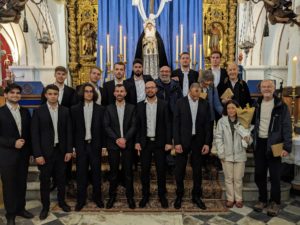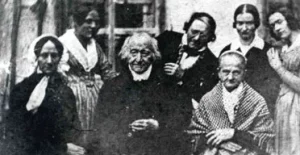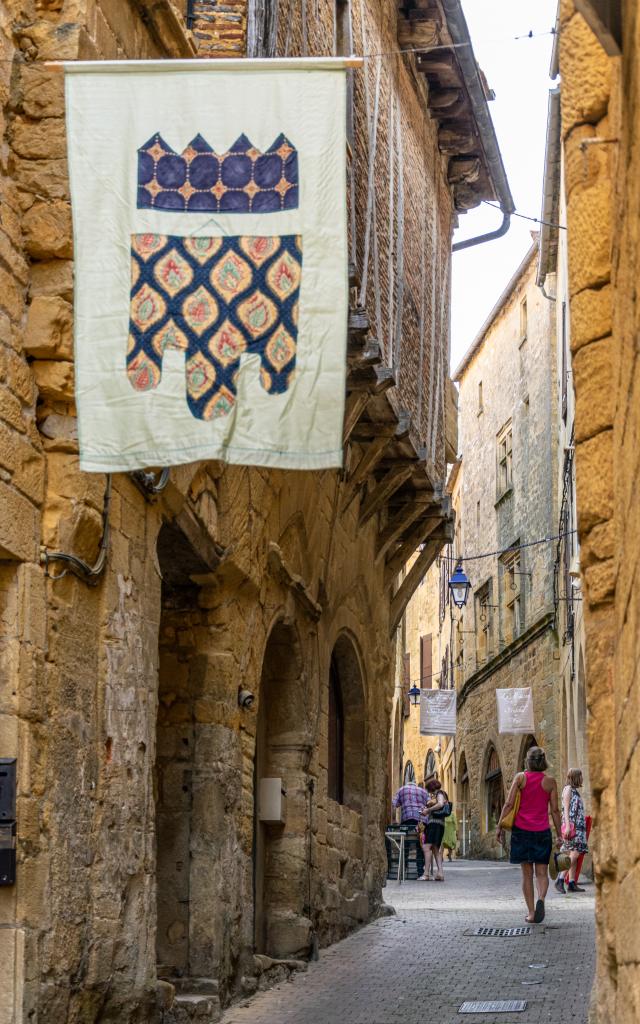September: I am writing to let you know that details of five new 2024 courses have just been published on the web site www.lacock.org. The first is in March (3rd to 8th), a continuation of our Andalusian pilgrimage with Gabriel Díaz, this time to the city of Granada. The repertoire will be based on the six-part Lamentations by Pedro Ruimonte, the Spanish composer who achieved eminence in the Low Countries, with the Englishmen Peter Philips and John Bull in positions under him. The course will be in an ancient monastery in the historic centre between the Alhambra and the mediaeval quarter of the Albaicín.
Then two weeks after Easter (14th to 19th of April) we go to Lyme Regis on the Dorset coast for Patrick Craig’s course on Portuguese renaissance music. This will include the Ave Virgo sanctissima Mass by Gery de Ghersem, a Fleming who made the reverse journey from Ruimonte, spending most of his life in Iberia. He was highly rated in his day and would be much better known today had most of his output not been destroyed in the Lisbon earthquake of 1755.
We are honoured that the Frenchman Lionel Meunier, founder and director of Vox Luminis, will lead a course for us in Tenby from the 5th to the 10th of May. We had been talking to Lionel about a Lacock course before covid but thought the continuing world-wide success of Vox Luminis would now mean that he is far too busy to fit us in. To our surprise he replied with great enthusiasm, being an admirer of the English choral tradition and having heard (we were glad to hear!) of the prestige of Lacock courses. His group really is remarkable: I heard their B minor Mass in London in June and was astounded by the blend of voices with each other and with the instruments, and impeccable ensemble, all without anyone seeming to be in command. That, Lionel told me afterwards was the secret: it forces the performers to listen to each other, adding mischievously that other conductors hate him. His Tenby course will include some music at low pitch, with basses going down to bottom D, and some singing from single-line notation, which has a surprisingly large effect on how you take in and perform the music. Another leading light from Vox Luminis, the soprano Szuszi (Sz pronounced as in Zhivago) Tóth, will offer individual coaching in vocal technique during the week.
After that come our regular two weeks at Monteconero on the Adriatic coast of Italy. It would be hard to beat as a course venue: a former monastery converted into a comfortable family-run hotel, still with its Romanesque church at its core. On its wooded hilltop set in a natural park it has views of the sea on three sides, and inland to the hills of the Marche and beyond them the Apennines. The first week (9th to 15th of June) will be Patrick Craig and a programme of motets by Tallis and others in seven parts, a voice grouping that seems to bring out the best in composers of renaissance polyphony.
In the second week (16th to 22nd of June) we are very pleased to introduce a new Lacock director, Lucy Goddard. Lucy is making a name for herself both as a singer and as a conductor and has a deep love of Italy, having lived there after a reading French and Italian at Cambridge. Her programme is music inspired by Song of Songs texts by early composers from Guerrero to Schütz and the beautiful ‘Rise up, my love’ by Howard Skempton.
I haven’t said which of these courses are by invitation and which are not. In fact the distinction is not as clear cut as you might suppose: anyone can let us know that they would be disposed to accept should an invitation to a course be forthcoming; if you are aware that by dint of fluent reading, a focussed tone with full dynamic range and speed of cottoning on to what the director is asking you to do, you often act as unofficial ‘leader’ of your section, you will probably fit in to a Lacock invited course. On the open courses, now generally oversubscribed, we have begun to reserve places for a core of invitees to fulfil this leadership role.
We have just finished our Josquin course here in Gourdon, where I still am. The final concert – with pieces by Jean Mouton, Jean l’Héritier, Loyset Compère, Jean Richafort, Pierre de Manchicourt and Thomas Crecquillon it couldn’t have looked more French – was a great hit with the locals. They initially put out 60 chairs but in the end needed 150. That was more than the permitted maximum for the church, according to our very helpful contact from the Mairie: “. . . selon les normes . . . mais . . . chut!!!” A Frenchman recently told me that you are not truly French until you know which rules to obey and which can be safely ignored.
One of the 150 was Simon Carrington, founder member of The Kings Singers and more recently director of choral studies at Yale University. He has a house near Gourdon. I had met him fifty years ago when David Munrow and three others of us from the Early Music Consort of London went to play on the Kings Singers recording ‘The French Collection’. The session turned into an unseemly power struggle between David Munrow, who, shall we say, liked to be in control, and the producer George Martin, who then enjoyed almost god-like status, having spent the last decade producing all the Beatles’s recordings. None of the Kings Singers, whose recording it was meant to be, managed to get much of a word in. I kept my head below the parapet, a proven survival technique in such situations.
By the way, did anyone think of asking the humble and meek if they really wanted to be exalted? It seems so out of character. Surely the response would have been: “Thanks, but we’re quite happy as we are . . . if that’s all right with the rest of you.”
May: We’re just back from Skipton in the Yorkshire Dales and the challenging but ultimately rewarding Schütz, Schein and Scheidt week with Justin Doyle. Before that, Cádiz with Gabriel Díaz and Tenby with Patrick Craig went off with great aplomb, and we are working hard to keep an upward trajectory. Incidentally, the three new venues were outstanding, so I am sure we will return to them all in due course.

Our Croatian friend Vinko Buble saw that we were going to be in Cádiz and asked if we could organise a concert for his Trogir cathedral male voice ensemble. We were delighted to organise, with the help of our local contacts, their first overseas performance in the Iglesia de San Juan de Díos before a capacity audience. The evening was a great triumph and the only disappointment was that the carefully prepared English introductions were met by a blank incomprehension. Spain, of course, has a world language of its own.
The rest of the courses later this year are all already very well subscribed, but most have the odd place available and there are always the inevitable later cancellations, so it’s well worth asking if you would still like to join any group. In a couple of weeks at Monteconero it’s Palestrina’s successors with Eamonn Dougan and double choir requiems by Duarte Lobo and Frank Martin with JanJoost van Elburg. July sees our visit to Edinburgh for part II of Rory McCleery’s exploration of music in Scotland in the 16th century.
There are a few more places on the later weeks, beginning with the Josquin week with Rory Wainwright-Johnson in Gourdon en Quercy. This area of southwest really is la France profonde and the week will be a total immersion in French music and culture. The small historic town is surrounded by walnut groves, flocks of ducks and geese, herds of Limousin cattle and above all large tracts of oak and chestnut forest. The very different wine areas of Cahors and Bergerac are within an hour’s drive.
Then comes Patrick Craig’s week in Trogir in Croatia, which has been chock-a-block for some time, followed by Bill Carslake’s ‘Grace, Mary and the Sea’, in Dartmouth. This was originally scheduled for the winter school in 2021, which we had to cancel because of the pandemic. Some very able singers enrolled what we announced the new dates in January, so we added two substantial works to the repertoire: Cipriano de Rore’s seven-voice Mass Praeter rerum seriem and Morten Lauridsen’s O magnum mysterium. There are a few places still available, so let us know if you are interested. The dates are the 22nd to the 27th of October. The full details of all the courses are as always on our web site www.lacock.org.
Our programme for 2024 is taking shape. We continue our Andalusian odyssey with Gabriel Díaz from the 5th to the 10th of March, this time to Granada. Then in April (the 8th to the 12th) Patrick Craig will lead a course in Lyme Regis, to continue our exploration of sea-side towns with magnificent churches. The repertoire will be Portuguese polyphony, including the virtuoso Missa Ave virgo sanctissima by Gery de Ghersem, a composer who would be much better known today had almost his whole output not been destroyed in the Lisbon earthquake. In May (the 5th to the 10th) the French director Lionel Meunier will make his debut as a Lacock director with a course in Tenby. Lionel is a huge name in Europe through his group Vox Luminis but not so well known, perhaps, in the UK. He has a great admiration of the British choral tradition although he himself offers a very different approach. I have seen him in action in a workshop and can promise you a very interesting and stimulating week. Lionel’s wife Zsuzsi Tóth, a soprano with Vox Luminis, will be on hand to offer individual lessons in vocal technique. In our first week at Monteconero Patrick Craig will direct a programme of polyphony in seven parts, a particularly luscious sonority, followed by a week inspired by Song of Songs, mainly from the Renaissance but including Howard Skempton’s Rise up my Love. It will be directed by Lucy Goddard, a young singer and conductor with a fast-growing reputation on both early and modern music. The rest of the year is taking shape, but it is still a little too nebulous to be specify details, except to say that JanJoost van Elburg will lead a course in the Dalmatian port of Trogir – including singing in a mass in the cathedral, from the 2nd to 8th of September.
Now that most of the courses are fully subscribed, we are filling more of them wholly or in part by invitation. This makes it easier for us to reach a good balance of voices, ages and nationalities and to achieve a group with a good proportion of ‘leaders’ – singers with a focussed tone and dependable readers – which enables us to work at a faster rate. There is not meant to be anything secretive or exclusive about this. In any group there is bound to be a range of ability and competence and the response form on our web site lets anyone express an interest in any invited week. Of the courses mentioned above, those with Lionel Meunier in Tenby and Patrick Craig at Monteconero and JanJoost van Elburg in Trogir will be by invitation.
It is sad to report the death of Heather Parker in March. Heather had become a regular singer at Lacock events and had an outstanding gift for friendship. Her love of Germany and the German language grew from a stint there as au pair and a lasting friendship with her host family. Her touching last words to me, in an email four days before she died were “ . . . my thanks to you for all those wonderful years of singing. Monteconero with JJ last year was the happiest I have been since Kenneth died. Love, Heather”.
The Lacock Scholars, directed by Greg Skidmore (the prototype Lacock scholar) are back to a regular series of appearances in London. The next concert will be ‘Summer of Love’ at St Mark’s Regent Park at 7.30pm on Thursday the 15th of June. On Friday the 21st of July they sing choral evensong in Westminster Abbey. The best way to keep in touch is to join their emailing list via their web site http://www.lacockscholars.org/.
It was good to see two Lacock scholars (we use small s for previous holders of the award: a large S for the group) singing at the Coronation in Westminster Abbey: the bass Stuart O’Hara and the tenor Mark Bonney. As scholars it was clear that they both had enormous potential and should go on to great things. Stuart tells me they reminisced fondly about their appearance in the Monteverdi Vespers directed by JanJoost van Elburg at our Ludlow Summer School in 2016. Was it really so long ago?
January: Happy New Year to you from the Lacock team. Let’s hope that 2023 doesn’t have any nasty surprises up its sleeve. I know this follows rather soon after our last newsletter, but we have just published details of three new courses on the Lacock website and we thought you might like to know right away.
Our first course in France for almost a quarter of a century will be in small town of Gourdon en Quercy in the southwest, on the border of the Lot and the Dordogne – la France profonde – at the end of August. The timing is carefully chosen: the heavy heat of July and early August should have abated and we should be able to enjoy a recess from labour in a climate that disposes one to idleness, as Tobias Smollett puts it in his Travels through France and Italy. Rory Wainwright Johnson’s programme will set Josquin des Pres in the framework of his contemporaries of the Franco-Flemish school of composers. The dates are the 27th of August until the 1st of September.
Next up will be a return to the delightful old Venetian port of Trogir in Dalmatia. With now so many excellent venues to choose from we tend not to visit the same place in consecutive years, but our course there in September was discovered by Vinko Buble, who directs music in Trogir cathedral. He sat in on several of our sessions and has invited Patrick Craig back to work with the students of Zadar and Split universities. Patrick’s programme, inspired by the link between Trogir and Venice, explores some of the music of the important Venetian forerunners of Monteverdi: Adrian Willaert, Cipriano de Rore, Giovanni Croce and Andrea Gabrieli. Vinko will arrange for us to spend one afternoon singing in the Roman emperor Diocletian’s 4th century palace in Split, a short ferry ride away, and has invited us to sing mass in Trogir cathedral. For this reason the course will start on Monday the 11th of September and finish on the Sunday morning, the 17th of September.
The final course of 2023 will a return to Dartmouth for Bill Carslake’s programme ‘Grace, Mary and the Sea’, with substantial works in honour of the Virgin Mary by Josquin, Willaert and Mouton. The concept and repertoire provoked a lot of interest when we advertised it before for the 2021 winter school, which we had to abandon because of covid. Of course it would be foolhardy to predict the weather in this part of the world, but let’s hope for the blazing autumn week that Devon can sometimes pull out of the bag.
That makes the full Lacock 2023 programme:
March: Cádiz, Spanish and Mexican music with Gabriel Díaz
April: Tenby, Byrd quatercentenary with Patrick Craig
May: Skipton, German music from Senfl to JC Bach with Justin Doyle
June: Monteconero, Palestrina’s successors Eamonn Dougan
followed by Duarte Lobo and Frank Martin with JanJoost van Elburg
July: Edinburgh, renaissance music in Scotland with Rory McCleery
August: Gourdon en Quercy, Josquin & Co. with Rory Wainwright Johnson
September: Trogir, Venetian music in the 16th century, with Patrick Craig
October: Dartmouth, Josquin, Willaert and Mouton with Bill Carslake
Those in the earlier part of the year are already well subscribed, but there are still places in some voices so it’s still worth applying. We have blurred the distinction between the courses that are open to all and those to which you have to be invited; the form on the web site now lets you register an interest in an invited course, and we have been keeping a few places for some invited singers on the open courses.
A circular from the Kodály Academy reminded me of what a debt all musicians owe to Zoltán Kodály. Born in 1882 and recording Hungarian folk songs on waxed discs in the first years of the last century, he now seems a figure from music history. Yet in what we would now call my gap year, I sat behind him at a concert at the Aldeburgh Festival. Aldeburgh’s Jubilee (Queen Victoria’s I assume) Hall didn’t have raked seating, so I was rather pleased that the little old man in front didn’t obscure my view of the madrigal group led by Peter Pears. I was told who he was only after the performance. At the age of 77 Kodály had married his 19-year-old student Sarolta Péczely, who is still alive in Hungary. Another surprising overspill from one age to another cropped up a few years ago. We picture Mozart in his world of powdered wigs and silken foppery, an age away from the early years of photography and Brunel, say, with his cigar and stovepipe hat in front of the launch chains of the Great Eastern.  Yet in 2006 a photograph of Mozart’s widow Constanze turned up in the archives of the southern German town of Altötting. She is the dour figure on the left, apparently looking down at her boots. The photograph was taken in October 1840. Constanze died just over a year later at the age of 79.
Yet in 2006 a photograph of Mozart’s widow Constanze turned up in the archives of the southern German town of Altötting. She is the dour figure on the left, apparently looking down at her boots. The photograph was taken in October 1840. Constanze died just over a year later at the age of 79.
The Lacock Scholars have made a welcome resumption of activities and are in cracking form. With their conductor Greg Skidmore they gave a magical Christmas in St Mark’s Regent Park in London. The repertoire centred on Tallis’s Puer natus mass and included Mouton’s heart-stopping Nesciens mater, which is also on the bill for the Dartmouth course in October. The concert attracted a sizeable and largely young audience. Let us know of you would like to be on their emailing list – and bear them in mind if you run a festival or concert series.

